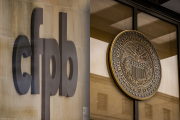
WASHINGTON — Rep. Andy Barr, R-Ky., chairman of the House Financial Services Subcommittee on Financial Institutions and Monetary Policy, will introduce a bill today that would make it easier for banks to appeal regulators' ratings of their institutions, according to a bill summary first shared with American Banker.
The bill would establish a so-called Office of Supervisory Appeals at banking agencies and the National Credit Union Association. That alludes to
The legislation comes up as Republicans continue their push against the Biden administration's banking regulators. It's likely to face criticism from Democratic lawmakers and regulators, many of whom are likely to object to placing industry-friendly officials in a position to overturn supervisory ratings from regulators.
That short-lived Office of Supervisory Appeals at the FDIC was created in the final days of the last administration, and was quietly
FDIC Chairman Martin Gruenberg, however, voted against creating the Office of Supervisory Appeals while serving as an FDIC board member during the Trump administration. He said that it allowed former bankers with deep industry ties to serve in an oversight position.
"This would fundamentally undermine the independence and integrity of the review process," he said at the time. "This is a vague, deeply flawed proposal that may well have a chilling effect on the FDIC's safety and soundness and consumer protection examinations. While the current process may not be perfect, it at least meets the threshold of independence and accountability envisioned by the statute."
Under Barr's bill, the FDIC, Office of the Comptroller of the Currency and Federal Reserve would establish an Office of Supervisory Appeals, which would be tasked with running the intra-agency process. Then, each of those agencies would establish a pool of officials to hear intra-agency appeals.
Those officials would include individuals with bank regulatory experience, private sector experience and those recommended by the bank trade associations and banks themselves.
A bank that wants to appeal their supervisory rating would first appeal to their regulator's head of supervision, and then to a three-member panel that would conduct a new review of the rating. The bank would have a right to an informal hearing before the three-official panel, but would not be subject to cross-examination.
The bill would also require the FDIC's inspector general to review the FDIC's receivership and resolution of any institution that "results in material loss" to the Deposit Insurance Fund, and to issue a report to Congress containing the results. The bill would also require that the banking agencies complete examinations of banks within 270 days of beginning their exam, or to provide a detailed, written notice of any delay.






